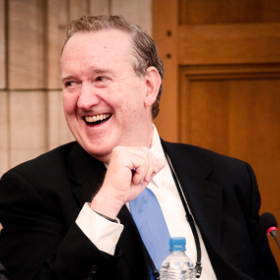
John Mroz's Take on "New Global Realities"
On May 3, 2012, John Mroz, President of the EastWest Institute, visited the offices of Eirëne in Manhattan to discuss major international policy trends and challenges to economic development.
Eirëne, a New York-based start-up focused on for-profit development projects, convened a group of young leaders to speak with Mroz about the state of international politics and the many obstacles to development initiatives.
“Through our Center for Purpose, we host dialogues that allow us to learn, innovate, and collaborate,” said John Kluge, co-creator and managing partner of Eirëne. “They create context for how we build purpose-driven ventures and how we can make them better. No one can solve billion person problems alone, hence the need for cross-sector, cross-generational partnerships and exchanges.”
Mroz’s presentation, titled “Stepping Up to the New Global Realities,” identified the rise of the global middle class as a major security test, citing the strain such growth places on vital resources, especially food, water and energy.
Expert predictions estimate today’s energy infrastructure can sustain a global middle class population of about one billion, but the current number is more than twice that already. Mroz also stressed the interdependence of food security and water security, lamenting the fact that key food and water players rarely interact with each other in beleaguered regions like the Horn of Africa.
In looking at the impact of resource scarcity on the ground, Mroz cited the polling firm Gallup’s means of testing for unrest among a populace. The results of this test, which consists of four questions, is termed a “deadly cocktail” when all responses reflect dissatisfaction. The answers to these questions, which touch on employment, corruption, and food availability, can give an early warning to revolutionary activities; negative responses to these queries spiked immediately prior to last year’s uprisings in Egypt and Tunisia.
The means of effectively mobilizing for security, Mroz added, have changed dramatically over the past 30 years. “Partnership models once consisted solely of the business and policy communities,” he explained, “but today’s development challenges demand additional participation from the technology, legal, and investment sectors.” It is also necessary to capitalize on the untapped potential of “under-30 policy and business influencers” as well as “the power of women,” two demographics largely absent from today’s political institutions.
The off-the-record portion of the consultation touched on political tensions in Southwest Asia, especially Iran and Syria, as well as major threats to international cybersecurity.


